Season 14 Announced!
From classic musicals to shocking contemporary works, Season 2016-17 promises to be a true “Cygnet” Season
Every season must reflect the mission of the company and for the past 13 years, Artistic Director Sean Murray has crafted uniquely Cygnet seasons that reflect the commitment to “startle the soul, embrace diversity and ignite debate.” This year is no exception. The seven productions in Season 14 range from the traditional to the avant- garde and include two musical theatre classics, a two-show repertory by a Pulitzer prize-winning playwright, the return of a holiday favorite and two contemporary works sure to shock and amaze.
“I’m really proud of the diversity and quality of this season,” says Murray. “Leave it to us to go from a stripper, to an ex-con, to one naughty little boy in just one season. That’s exciting. That’s Cygnet!”
SEASON XIV: 2016-2017
List of Plays
GYPSY
July 14th – Sept 4th
Music by Jule Styne and Lyrics by Stephen Sondheim
Book by Arthur Laurents
Directed by Sean Murray
Choreography by David Brannen
Music Direction by Terry O’Donnell
Indomitable stage mother Rose chases vicarious success and stardom as she pushes her daughters through the vaudeville circuit. When Dainty June flees the act to elope, Rose vows to make introverted Louise into a star. Boasting one show-stopping song after another—like “Everything’s Coming Up Roses” and “Let Me Entertain You”—this classic musical was inspired by the memoirs of the legendary burlesque dancer Gypsy Rose Lee. Featuring Linda Libby as Mama Rose, Allison Spratt Pearce as Louise, Katie Whalley-Banville as Dainty June, and Manny Fernandes as Herbie.
“The quintessential American musical” – Hollywood Reporter

Repertory
SEVEN GUITARS
Sept 28th – Nov 6th
By August Wilson
San Diego Premiere
In the backyard of a Pittsburgh tenement in 1948, friends gather to mourn for a blues guitarist and singer who died just as his career was on the verge of taking off. The action that follows is a flashback to the busy week leading up to Floyd’s sudden and unnatural death. Seven Guitars is part bawdy comedy, part dark elegy and part mystery. This lyrical play is the sixth in August Wilson’s ten-play cycle which charts the African-American experience through each decade of the 20th century and is performed in rep with King Hedley II.
“Rich, music-drenched drama” – New York Times
Repertory
KING HEDLEY II
Sep. 29th – Nov. 6th
By August Wilson
San Diego Premiere
King Hedley II shares the story of King –a man recently released from prison, attempting to rebuild his life amid changing times and a backdrop of the crime and drug struggles in the community he exists in. King dreams of a life of stability and self-reliance beyond incarceration, gangs and broken family. The play dares to ask what it takes to transcend the limitations of life and personal circumstance, and if pure will is enough to change a man’s destiny. King Hedley II is the eighth play in August Wilson’s ten-play cycle that, decade by decade, examines African American life in the United States during the twentieth century.
“Mesmerizing…. Full of powerful images that convey the darkly comic dialogue between hope and hopelessness in African American life.” – N.Y. Daily News
A CHRISTMAS CAROL
Nov 22nd – Dec 24th
Adaptation & Lyrics by Sean Murray
Original Score by Billy Thompson
Directed by Sean Murray
Musical Direction by Patrick Marion
Cygnet Theatre invites you to start your own family tradition with one of ours. This season welcomes the return of the holiday classic adapted from Charles Dickens’ timeless tale of hope and redemption. This re-imagined, fully staged production features original new music, creative stagecraft and puppetry, and live sound effects. Step into a Victorian Christmas card for a unique storytelling experience that is sure to delight the entire family!
“Critics Pick” in 2014 – San Diego Union Tribune
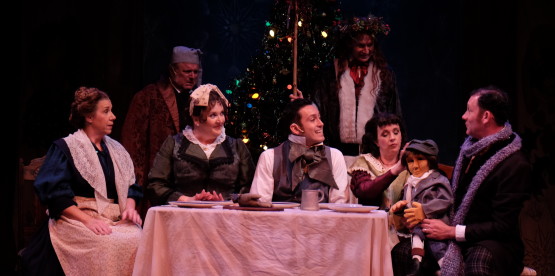
BAD JEWS
Jan 12th – Feb 12th
By Joshua Harmon
Directed by Rob Lutfy
San Diego Premiere
The night after their grandfather’s funeral, three cousins engage in a verbal battle royale over a family heirloom. In one corner is the unstoppable and self-assured force of “Super Jew” Daphna. In the other, the immovable and entitled object of her secular cousin Liam. And in the middle is Liam’s brother Jonah, trying to stay out of the fray. Bad Jews is a savage comedy about family, faith, and legacy.
“The funniest play of the year.”-The Washington Post
“Delectably savage humor” – The New York Times
ON THE 20TH CENTURY
March 9th – April 30th
San Diego Premiere
Book and Lyrics by Betty Comden and Adolph Green
Music by Cy Coleman
Directed by Sean Murray
Its nonstop laughs aboard the Twentieth Century, a luxury train traveling from Chicago to New York City. Luck, love and mischief collide when the bankrupt theater producer Oscar Jaffee embarks on a madcap mission to cajole glamorous Hollywood starlet Lily Garland into playing the lead in his new, non-existent epic drama. But is the train ride long enough to reignite the spark between these former lovers, create a play from scratch, and find the money to get it all the way to Broadway? Featuring Eileen Bowman as Lily Garland and Melinda Gilb as Letitia Primrose.
“Old-fashioned musical comedy magic”– USA Today
“The show is a nonstop delight.” – The New York Post
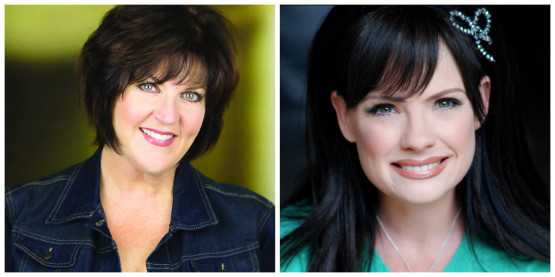
SHOCKHEADED PETER
May 18th – June 18th
West Coast Regional Premiere
Music by Adrian Huge, Martyn Jacques, Adrian Stout
Lyrics by Martyn Jacques
Book by Julian Bleach, Anthony Cairns, Graeme Gilmour, Tamzin Griffen
Based on Struwwelpeter by Heinrich Hoffmann
Directed by Rob Lutfy
Fall into the world of Victorian Steam-punk nightmares as a manic music-box spins stories of naughty children and misguided parents. Silly and sinister, Shockheaded Peter dares us to ask what’s beneath the floorboards. Don’t miss the most damning tale ever told on stage!
“A vile and repulsive story told by reprehensible characters in a thoroughly degenerate fashion – Absolute Bliss” – David Bowie
“A wryly seedy cabaret-punk musical” -Variety
Come join us for this wild ride! Tickets and new subscriptions will be available for purchase on March 1st.
Sitting down with the Director
Artistic Director Sean Murray shares his thoughts on our upcoming Sam Shepard shows – Fool for Love & True West
Cygnet is continuing it’s tradition of plays performed in rotating repertory. What’s different about this rep?
This season we are focusing exclusively on the work of a single playwright. Each play stands on its own and you don’t need to see one to appreciate the other. However, when you are able to experience these two different plays side-by-side, one begins to recognize common themes between them. Both plays explore a crisis of identity and betrayal. Characters in both shows experience an existential soul searching and a feeling that their lives are inauthentic. They also are pretty funny people as they grapple with essential issues such as disconnection, empty searching and a deep sense of betrayal.
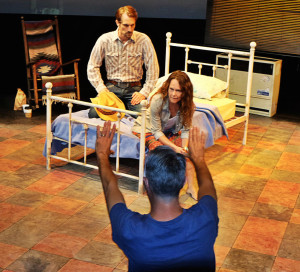
When did you first become aware of Sam Shepard’s work?
I first became aware of Shepard’s work in the early 80s when I worked as an actor for the San Diego Repertory Theatre. At an early age, I was cast as Crow, the punk-rock-pirate from The Tooth of Crime. I worked there when they presented the San Diego premieres of True West and Fool for Love, again in the early 80s. Additionally, while I was in school at the North Carolina School of the Arts, I played Weston in Curse of the Starving Class, a show I later produced at Cygnet Theatre.
What are the challenges you face when staging True West?
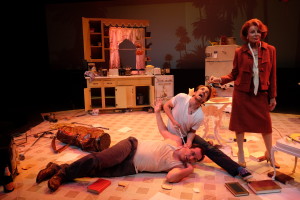
On a purely technical level, the script has the two brothers literally destroy the suburban kitchen that is the set. We have fifteen toasters, that all have to make real toast, a typewriter that is literally pounded into pulp by a golf club wielding character, the contents of kitchen cabinets thrown across the floor, a wall-phone that become a weapon after it is torn from the wall! The actual aftermath of all of this chaos has to be carefully considered.
The acting challenges are also vast. Each character goes on an existential journey from the quiet, tension-filled first scene to the all out chaotic war of the final scene. Pacing this progression is important. Finding the way into the levels of envy, threat and betrayal that these characters must portray is a frightening and exciting process for the actors.
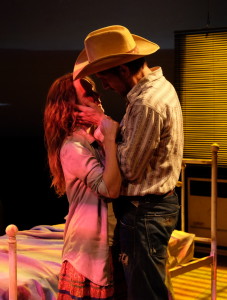
Fool for Love is both arduous and physically challenging. What’s your take on this play?
The biggest challenge we’ve experienced in getting into the depths of Fool for Love has been in determining what is true and what isn’t. The characters accuse each other of lying throughout the play. There is a layering in this play that conceals the actual truth that they are running from. Like Austin in True West, May is attempting to recreate herself anew. She is trying to escape what she was and forge a new self. The sudden reappearance of Eddie, like the reappearance of Lee in True West, forces a confrontation between one who wants to hold the other to who they have been, and the other who is trying to break with their past. As we explore what is actually happening between these characters, and we continue to raise their stakes in the play, that informs the level and veracity of the physical actions.
Can you share some of your thoughts about deciding to take on these plays?
These two particular plays are rooted in a sort of realism. I say “sort of” because on the surface they take place in a kitchen or a motel. There are real props, etc. The character dialogue sounds like a realistic conversation on the surface. However, there is a very strong poetic quality to the language and imagery. Finding actors who can develop these characters to the marrow and handle the heightened poetic language is not always easy. In addition, when you are trying to cast actors who have to also be ‘right’ for not just one role but two different roles, this adds a new challenge.
Don’t miss Fool for Love and True West Sept. 24 – Nov.2.
7 Things to Know: Fool for Love & True West
As part of our goal to help you understand the thought-provoking work of American playwright and icon Sam Shepard, we’ve put together 7 things you should know about Fool for Love and True West. If you don’t already, follow us on Facebook for daily “fun facts” about Sam Shepard, the plays, as well as behind-the-scenes info and pictures.
3 things worth knowing about Sam Shepard’s Fool For Love:
-First performed at the Magic Theatre in San Francisco on February 8th 1983 with Kathy Baker as May and Ed Harris as Eddie.
-It was nominated for the Pulitzer Prize for Drama in 1984.
-The play was turned into a movie in 1985, for which Sam Shepard also wrote the screenplay and starred as Eddie opposite Kim Basinger as May.
4 things worth knowing about Sam Shepard’s True West:
-First performed at the Magic Theatre in San Francisco on July 10, 1980.
-It was nominated for the Pulitzer Prize for Drama in 1983.
-It was nominated in 2000 for the Tony Award for Best Play.
-The play was turned into a made-for-TV-movie in 2002, which starred Bruce Willis and Chad Smith.
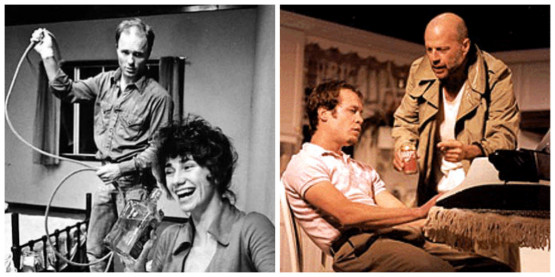
Meet Braxton Molinaro
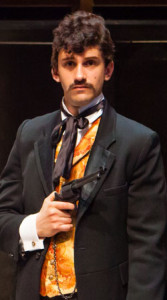
Katie Harroff sat down with Braxton Molinaro, who is currently playing John Wilkes Booth in ASSASSINS at Cygnet Theatre. Braxton went to school in North Carolina and currently lives in New York.
Hi Braxton, Welcome to San Diego! How are you enjoying working with Cygnet Theatre? How did you become connected to us?
Oh man, Cygnet Theatre is an absolutely stellar company. They are as pro as it gets. I believe the designers, the cast, and all of the work that has gone into Assassins is inspiring. The actors are remarkably talented! Sean does such a great job casting unique people who bring a lot to the table. You can’t overlook the weather out here too. It’s pretty ideal to get notes in the sun. I get to smell flowers and see palm trees. San Diego has become an amazing retreat.
As far as how I became connected to the company- I was in a production of Oklahoma directed by Terrance Mann at my now alumni school: The North Carolina School for the Arts, where Sean Murray had also attended. In the production I played Judd. Sean came out to NC to see the show and we became friends. When the season was announced at Cygnet I saw that they were doing Assassins so I reached out to Sean and asked if I could send him a tape and he said sure. I was fortunate to get an offer!
Who are you playing, and what is your character like?
I’m playing the infamous John Wilkes Booth- the very first presidential assassin. Obviously he is deeply flawed, but he loves presentation. Booth was the bastard son of a famous acting family. He had a good career as an actor- sometimes 9 different pieces of material in a week. He had a plethora of opportunities to get on the stage, and probably what would be considered a very admirable performance career to most people. Comparatively, however, to other members of his family he was not successful. This made him very desperate when he came into adulthood. He wanted to live up to the fame his father had succeeded in achieving. As far as motives to killing Abraham Lincoln- Booth had strong ties to the south, and had slaves. He believed it was an important part of being an American.
As an actor, I’ve had to find empathy for a man that is truly full of hate. While very challenging, finding the theatricality in that has been fun. Booth has this daring, unapologetic outward buffoonism to him.
Why should people come see this production of Assassins?
I’m biased because I’m so happy to be here. But I can’t say enough about the importance of this piece. I believe Assassins is such an important play to be performed right now. It will inspire theatre goers to have a conversation- which is what theatre is about. This play gives us the opportunity as a society to look at the people that are causing a lot of turmoil in our country. The message of Assassins is to listen. The Assassins aren’t being heard and they think killing is the only way to make that happen. I think that scary sentiment is shared with a lot of people that live in this country today, and we need to take a look at this. We need to become aware of the possibilities of the things we don’t want to address.
I think a musical-format in expressing this idea is brilliant trickery that allows audiences to see this message while being wildly entertained.
Assassins runs through April 28th!
Meet Stephen Metcalfe
 In January 2011, Cygnet Theatre will have the honor of producing its very first World Premiere – The Tragedy of the Commons, by celebrity playwright Stephen Metcalfe.
In January 2011, Cygnet Theatre will have the honor of producing its very first World Premiere – The Tragedy of the Commons, by celebrity playwright Stephen Metcalfe.
Stephen Metcalfe, a nationally renowned stage writer, is possibly most recognized for such Hollywood blockbusters as Pretty Woman (with Julia Roberts and Richard Gere) and Mr. Holland’s Opus (with Richard Dreyfuss).
CT: Did you start out writing for film?
SM: I started out as a playwright. Between 1978 and 1985 I wrote five full length plays and perhaps half a dozen one act plays. Even though all the work was produced, I was in no way, shape or form making a living from it. At one point I thought it might be a relief to go into advertising.
CT: What are some of the differences between writing for film versus the stage?
SM: I discovered early on how difficult plot can be. In the theatre, plot is an excuse for people to talk. In a movie, it’s a reason for them to blow things up. Here’s another difference. If a play is a house, others can decorate, but they can’t tear down the walls. It’s yours, you own it. If a screenplay is a house, people can tear it down to the foundation, dig a deep hole and throw away the key. They own it. (This doesn’t mean that sometimes you don’t get the credit – or blame – for what they did.)
In the theatre no one is asking you to be a playwright – in fact, if pressed, they’d probably tell you to go into advertising – but if you write a play, they’ll read it. In film, no one reads anything. But if they hear you’ve done something that’s pretty good, they’ll pay you to do something else.
CT: What impact did your success with Pretty Woman have on your career as a writer?
SM: For better or for worse, in 1991 I wrote the production draft of the screenplay for Pretty Woman. And so for the next ten years the phone rang pretty much on a weekly basis with someone – who, as mentioned, had usually never read my work – asking me to re-write a romantic comedy. The problem was I didn’t consider myself a writer of romantic comedies. But as I was trying to do silly things like pay a mortgage and raise a family, as often as not I’d take the job. But in between re-writing romantic comedies I continued to write my own screenplays on spec. This, to some extent, took the place of my writing for the theatre. It felt the same. My own screenplays I hoped/felt were character and dialogue driven and were emotionally grounded; they felt to me as if they were about real things. Of course, they didn’t have a snowball’s chance in hell of getting made.
CT: What prompted you to begin writing for the stage again?
SM: In 2005 I had a growing realization that though I’ve made a living as writer, the best work I’ve done is probably sitting on shelves in LA somewhere. Did I mention that a dramatist writes for actors and an audience? The writing is not the end unto itself, seeing it done is. And so, with this in mind, the desire to see work done, I find myself writing plays again. I have no fantasies I’ll make a living doing it but that’s okay. I’m also going into advertising.
Straight from the horse’s mouth
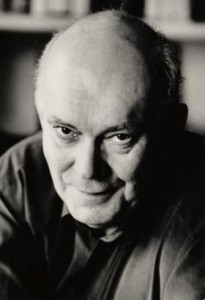 One of the questions we often get about The Norman Conquests is regarding the order in which the plays should be seen. Up until this point, we have said that part of the beauty of the trilogy is that it doesn’t really matter what order you see them in. All three plays stand on completely on their own, and since they are all set during the same weekend, the order they are viewed in doesn’t matter.
One of the questions we often get about The Norman Conquests is regarding the order in which the plays should be seen. Up until this point, we have said that part of the beauty of the trilogy is that it doesn’t really matter what order you see them in. All three plays stand on completely on their own, and since they are all set during the same weekend, the order they are viewed in doesn’t matter.
I have recently, however, discovered an article from Alan Ayckbourn himself, in which he explains in his own words the order in which you should see them for best viewing pleasure. The article was taken from The Ayckbourn Guides which were compiled by Simon Murgatroyd.
Enjoy!
Alan Ayckbourn Explains…
If you are in the process of reading this Programme, the chances are that you are already about to see, are in the midst of seeing, or have already seen, at least one of the plays that form The Norman Conquests. In which case, this advice is not for you. Do not read on.
For those who have seen none of the plays but may be wishing to do so, it is hoped that the following notes may prove useful.
The first thing to remember is, understandably, don’t see Table Manners first. This will give you a wrong time sequence and will only confuse you when you come to see, say, Living Together which, incidentally, you are strongly 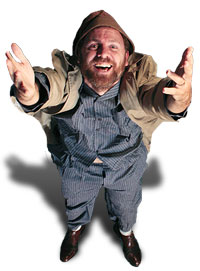 advised not to see second. Ideally, Round and Round The Garden should not be seen before you have seen Table Manners – but do not, on the other hand, fall into that old trap of seeing Round and Round The Garden after Living Together as this again will confuse the sequences of dramatic events. Do not see Living Together first as this will severely curtail a lot of the pleasure you gain from seeing Table Manners for the first time which latter play, for maximum enjoyment you should try and save till the end.
advised not to see second. Ideally, Round and Round The Garden should not be seen before you have seen Table Manners – but do not, on the other hand, fall into that old trap of seeing Round and Round The Garden after Living Together as this again will confuse the sequences of dramatic events. Do not see Living Together first as this will severely curtail a lot of the pleasure you gain from seeing Table Manners for the first time which latter play, for maximum enjoyment you should try and save till the end.
In short, do try and see all three plays first, or, if you really can’t manage this, last. This way you will avoid any disappointment. Like most things in this world, there is a logical progression i.e. Parts 1, 3 and finally, of course, 2.
I certainly hope this helped to clear things up. If not, contact the box office, and they will be more than happy to assist you in scheduling all three plays first (or last, if that is your preference).
Come to the Cabaret – Cygnet’s Gala
What is it about leading a fundraiser’s auction that makes it so appealing?
Interacting with Sean and Bill, Veronica and Manny, Jason and Jessica (a theatre’s dream team) off stage, behind the scenes, sharing a common vision of providing this little theatre with the means to produce big, relevant and important works is so satisfying.
It’s my raison d’etre. In addition, it’s provided me a grand occasion to meet people in my broader San Diego community with whom I normally would not cross paths.
Wow! What I am experiencing through this fundraising process has far exceeded any expectation.
Like everyone these days, I’m a busy person with way too much on her plate. Besides being haunted by a daunting calendar, auction canvassing is time spent on activities that don’t directly increase my bottom line. Never mind that! More importantly, it compromises family time, which is primo to me. But being on this auction committee and having the opportunity to support something for which I passionately believe is just plain irresistible! I’m a sucker for a good time. That’s why I do it. Continue reading
Postage Stamp Style
 My mother is an art teacher. She’s been teaching since I was 13 years old. She used to tell me that she was surprised to find she never ran out of new ideas for lessons. She always thought the day would come when she’d need a lesson on Van Gogh or Matisse and…nothing… No ideas. Blank slate. But that day never came. She said that was the beauty of art and creativity. It’s endless.
My mother is an art teacher. She’s been teaching since I was 13 years old. She used to tell me that she was surprised to find she never ran out of new ideas for lessons. She always thought the day would come when she’d need a lesson on Van Gogh or Matisse and…nothing… No ideas. Blank slate. But that day never came. She said that was the beauty of art and creativity. It’s endless.
On costuming modern day shows… Sean Murray seems to think I have a pretty good eye for dressing people in current fashions and has honored me with the title of costume designer for three Cygnet shows – all taking place in present day. But the innate difficulty of costuming a show that doesn’t depend on a historical time period for colorful expressions of the day is that – if you do it well – it will very often go unnoticed. And let’s face it… no artist (of any sort) wants their work to go unrecognized.
any sort) wants their work to go unrecognized.
To deal with this, I approach each show with a secret concept…something I’m pretty sure the audience won’t pick up on but satisfies me none-the-less. In Dying City I allowed the Iraq War to exist, not only as the background for the play, but on the stage within the costumes; the war between the characters playing themselves out in Peter and Craig’s all-American dress and Kelly’s subtly Middle Eastern-feeling fabrics, colors and jewelry. In Love Song, Beane requests “a rainbow” as a birthday gift, and upon his discovery of his new love Molly, the grays in the costumes dissipated into brilliant hues – even and especially in Joan and Harry’s apartment.
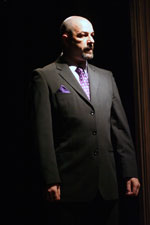 So when it came time to costume Mauritius, I began my musings for my special secret concept. I read the play. I read it four more times… Nothing. I went on-line and perused everything I could find about stamp-collecting, looking for the hook. Zippo. I thought about my mother. Where was that endless creativity? Maybe there was an artistic limit. Apparently my max for Cygnet was two shows. The gig was up.
So when it came time to costume Mauritius, I began my musings for my special secret concept. I read the play. I read it four more times… Nothing. I went on-line and perused everything I could find about stamp-collecting, looking for the hook. Zippo. I thought about my mother. Where was that endless creativity? Maybe there was an artistic limit. Apparently my max for Cygnet was two shows. The gig was up.
Finally…I admit it… I went on-line to look at the Broadway production photos. Then, other production photos. I felt uninspired. They were all the same. Dennis donned in a sleazy leather jacket. Jackie attired in the 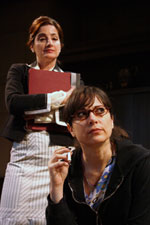 apparently requisite jeans and a hoodie. Mary bequeathed with the unflattering matronly threads of a spinster. Where was the whimsy? Worse… Why the stereo-types? This was a play submersed in cons and trickery, after all.
apparently requisite jeans and a hoodie. Mary bequeathed with the unflattering matronly threads of a spinster. Where was the whimsy? Worse… Why the stereo-types? This was a play submersed in cons and trickery, after all.
My inspiration came mid-conversation. Anytime I mentioned Mauritius to a friend, their response was the same. “Stamp collecting? Does anyone even do that anymore?” They imagined a production rife with antiquated lessons on the creation of the postal system. The delightful irony of the Quentin Tarentino-esque ride our audiences will take amused me. But then, there it was! These characters ARE submersed in a world of vintage collections. They are the world’s most obsessed tiny-art collectors. They LOVE the beauty of a bygone era. And they are suckers for the most intimate details.
 I began my search for modern-day clothes with a vintage-feel. Aside from Jackie, who discovers the crazy under-belly trade as the play progresses, the other characters seemed to naturally slip into each vest, tie, spectator shoe and hat; their love for classical elegance expanding into their fashion and limited only by the size of their billfolds. And, as luck would have it, the gorgeous cast of actors embraced and enhanced each handkerchief and glove with a modern-day spin. Sandy Campbell can wear a hat and Jackie-O sunglasses like no-one’s business and Manny Fernandes seems born to wear tailored suits and luxurious watches. John DeCarlo’s natural charm and humor lends itself to the feather in his hat and I’m quite certain that Jack Misset wore a bow-tie in another life.
I began my search for modern-day clothes with a vintage-feel. Aside from Jackie, who discovers the crazy under-belly trade as the play progresses, the other characters seemed to naturally slip into each vest, tie, spectator shoe and hat; their love for classical elegance expanding into their fashion and limited only by the size of their billfolds. And, as luck would have it, the gorgeous cast of actors embraced and enhanced each handkerchief and glove with a modern-day spin. Sandy Campbell can wear a hat and Jackie-O sunglasses like no-one’s business and Manny Fernandes seems born to wear tailored suits and luxurious watches. John DeCarlo’s natural charm and humor lends itself to the feather in his hat and I’m quite certain that Jack Misset wore a bow-tie in another life.
I love art. I love theatre. And I love my mom. As is often the case, she was right.
Mauritius; Scary, Funny and Suspenseful
Yesterday was our first preview for Mauritius. It’s always exciting for me when we open a new production but I especially get excited when the audience really get’s into a show. Last night was no exception. There was plenty of gasping and nervous laughter, just what you hope for with a suspenseful thriller.
All of us at Cygnet were pretty excited to assemble such a great cast. Three of the principal characters in Mauritius worked together previously in our 2007 production of Communicating Doors. Communicating Doors was such a fun production and these actors have a wonderful chemistry together. Manny Fernandes once again plays the guy everyone is afraid of, and Sandy Campbell and Jessica John play the eccentric half sisters. Rounding out the cast is John DeCarlo, last seen in Cygnet’s production of Bug and Jack Missett from Cygnet’s Curse of the Starving Class of a few years back. The characters in Mauritius are pretty quirky and the actors have tapped into their characters perfectly. I think the actors are going to have a lot of fun with this one.
The production is staged by Cygnet Associate Artistic Director, Fran Gercke. Fran gets great support from the spot-on design team of Jessica John (yes, she’s also doing the costumes), Eric Lotze (lighting), Matt Lescault-Wood (sound), Bonnie Durben (props) and Sean Fanning (set). I do love it when all of the components come together so nicely and click. I just can’t wait for the theatre goers to come out and see it for themselves.
Mauritius is a San Diego premiere and one of the newest plays by Theresa Rebeck, one of Broadway’s hottest playwrights. We’re so excited to have been able to secure the rights to this one. Mauritius runs at the Cygnet Rolando stage through May 10th.
Lights! Sound! Pancakes!
It’s Saturday morning and we are getting ready to begin technical rehearsals for Mauritius. Technical rehearsals can be exhilarating, because you finally get to see all of the elements start coming together. The lights and sound are added. The finishing touches are put on the costumes and the set. And while the twenty or so hours can make for a grueling couple of days of “hurry up and wait,” it is always amazing to come out of it on the other side and see the huge leaps the production has taken towards being a final product.
At Cygnet, tech means it’s time for a couple of traditions. The oldest being the magic of watching Eric Lotze work his wizardry on the light board. Eric has been designing lights for Cygnet since the very beginning, and I’ve never seen any designer who can manipulate the lights as fast as he can. With his eyes darting across the ceiling from one light to the next, his fingers fly across the light board’s buttons. It always reminds me of those accountants in old movies with their sleeves rolled up, visor pulled down, a stogie firmly planted firmly in one corner of their mouth, their right hand a blur producing a steady and rapid clicking from the keys. I swear I’m always waiting for his left hand to reach out and pull the lever. There’s no doubt why he has won several awards. His designs always add another level of dimension to the production.
Matt Lescault-Wood, is doing the sound design. Matt has done several designs for Cygnet this season, including the fantastic collection of 80’s music that was on display during The History Boys, but this will be my first experience watching him work. What I’ve heard of the sound design so far, it is going to be jazzy, hip and cool. It’s always great fun to hear a musical representation of your character and I’m looking forward to hearing what he has for my sadistic stamp collector.
The other tradition, which just began this season, is a pancake breakfast to kick off the technical rehearsals. It’s really nice to have a few moments before we delve into the work for the designers, cast and crew to come together like a family and share a meal. Plus feeding theatre folk is always a good idea. Of course the success of this breakfast may rest on my culinary skills. Somehow I was designated the flapjack flipper for this production. Oh, the pressure. I hope I don’t burn them.